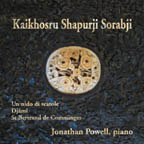Un nido di scatole, Djâmi, St Bertrand
Jonathan Powell (piano)
Altarus Records: AIR-CD-9082 (2007)
Web page for Altarus Records

Duration: 77:14
Track listing
- Track 1-17: Un nido di scatole (31:37)
- Track 1: Dapprima ecco la cosa che contengono le scatole. Con impetuosità. (0:33)
- Track 2: La prima scatola. Fuggitivo. (0:43)
- Track 3: La seconda scatola. (0:52)
- Track 4: La terza scatola. Abbastanza soave. (2:03)
- Track 5: La quarta. Un pochino religioso, ma senza ipocrisia alcuna! Piccolo preludio tascabile. (4:27)
- Track 6: La quinta. La mezza via tra legato i distaccato. (0:46)
- Track 7: La sesta. Con impertinenza graziosa. (2:07)
- Track 8: La settima. (“Omnium ecclesiarum urbis et orbis Mater et Caput”). (2:47)
- Track 9: L’ottava. Arabeschi gammatici. (Macche!) (1:14)
- Track 10: La nona. Ostinatissima come mai. (4:56)
- Track 11: La decima. Languido e sonnolento. (3:16)
- Track 12: L’undicesima. L’algolagniaco. (1:31)
- Track 13: La dodicesima. Con vivacissima impetuosità. (0:46)
- Track 14: La tredicesima. Con raffinamento affettato, quasi di piccola borghese che vorebbe darsi delle arie d’essere gran dama. (0:51)
- Track 15: La quattordicesima. Ein kleines Heldentenorleben. Mit Schwung, feurig. (1:28)
- Track 16: La quindicesima. Toccatissima. Si guarda un tocco sempre non legato, cioè quasi spiccato dei violinisti. (1:15)
- Track 17: La sedicesima. A rivederci! Con grande flessibilità. (1:53)
- Track 18: Nocturne: Djâmi (26:48)
- Track 19: St Bertrand de Comminges (18:49)
Reviews
- “Paradoxically, the more we discover about Sorabji’s output, the more complex his creative personality appears to be. As a case in point, consider ‘A Nest of Boxes’, a half-hour suite of ‘nested’ variations, in which each piece
epitomises in miniature a characteristic Sorabjian genre, written for one of
the very few performers who played Sorabji’s music during his lifetime, Harold Rutland. So we have a chorale prelude of cumulative intensity; a tropical nocturne; two toccatas of contrasting texture and the customary blistering virtuosity; a gorgeous chorale like a glimpse into the incense-laden atmosphere of a Mass in some great cathedral, a Richard Strauss parody that seems to have wandered in from the Hoffnung concerts, and so on. Add to this the almost unique feature of verbal in-jokes in the guise of performance directions, and we have a sketch of Sorabji’s working methods that conceals more than it reveals, which is also a tremendously exciting piece of kaleidoscopic contrasts and quicksilver variation of mood. St Bertrand sticks to one idea; the kind of highly virtuosic, compact free fantasia that embodies the kind of pianism that Sorabji was investigating in the 1940s, of which the summit, as we now know thanks to Mr Powell, was the Concerto per suonare da me solo. Based on a ghost story by M.R. James, St Bertrand is an essay in
narrative drama and richly textured atmosphere. By way of the most extreme
contrast, Djâmî is one of the finest example of the composer’s elaborate, ornamented hothouse ‘tropical nocturne’ genre. Named for the Persian poet Jami and prefaced by a quotation from his masterpiece ‘Yusuf and Zulaikha’, the work mirrors the complex argument and obsessively detailed description of Islamic poetry and art in Sorabji’s most harmonically rich and intoxicating
style. Unusually in Sorabji’s output, and probably a result of its connection to his Persian heritage, the piece contains gestures which seem explicitly to evoke Eastern musical idioms. ” (Records International)
 Duration: 77:14
Duration: 77:14
